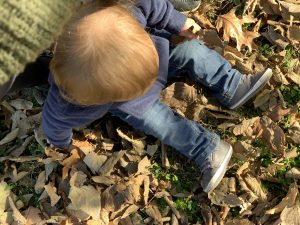My son Q is fourteen months old now. When Q was thirteen months, he began walking, and with it, he started getting into things. I asked my mom, other moms, and Google, when is it appropriate to start disciplining? Well, like pretty much everything else with parenting, it is entirely up to you when, if and how you discipline.
I will admit, I do not like this like aspect of parenting. Up until now, I was able to coast through being a fun parent. Now, I must say “No,” and reprimand behavior that is not okay. I now get to experience my sweet son getting upset with me when I try and quell his primitive behavior. In the book, The Happiest Toddler on the Block by Harvey Karp M.D, he refers to children during these early stages as “uncivilized cavemen”. My husband Bernard and I lovingly refer to Q as a wild monkey. While I would love to continue to coast, I recognize that disciplining is my duty as a parent. It may not always make me liked by my son, but in the grand scheme of his life, it is necessary.
There are several observations and understandings I have come to learn upon my research on discipline.
I have gathered that those who dislike the idea of disciplining view it as punishing and do not want to be the bad guy in their child’s eyes. Reframing how you see discipline can have a considerable impact. Rather than viewing disciplining as a form of punishment, it can be seen as teaching. Instead of having the mindset that you are punishing your child for misbehaving, you can view it as teaching him/her how to behave.
When you become a parent, it is natural to look at how your parents did things and evaluate them. I’m sure you will find things you liked and disliked. What I found in my discussions with others and reading blogs online, is that if someone was disciplined on one end of the spectrum, they try to overcorrect by parenting the complete opposite. For example, if a person grew up in a rigid and strict authoritarian household, they overcorrect and parent in a laid back and passive fashion. I believe it is necessary to reflect upon our upbringing, and determine a middle ground, recognize that you are not your parents. Ideally, one has a partner who can assist in finding the middle of the spectrum.
Something that has been genuinely eye-opening as a mom is that everything Q does, sees, hears, smells, tastes, and touches are new to him. I understand the frustration a parent might feel when a child misbehaves, but something I think that is easily forgotten is children do not come into this world knowing how to behave, they must be taught. They learn how to act either by instruction or by observing. If you get frustrated, your child will see that and believe that is the way to behave. Also, in my research, I learned that children do not pick things up right away. It shouldn’t have been as surprising as it was, I do not pick things up easily the first time, I often have to do it several times before I get it. It is the same for a child. Therefore, as parents, you must remain patient and use continuous repetition to get the desired results. Q kept touching our blinds in the living room area. It took about a week of consistently telling him, “No,” and using short time-outs for him to learn, he isn’t allowed to touch the blinds.
Consistency is also vital in disciplining. I have fallen short of this requirement myself. I tell Q he cannot get into something, but then when I am in the middle of making dinner and see him do it, I let it slide. I recognized this is sending mixed messages, so I am working on sending clear directions about what is right and what is wrong.
One point that is frequently touched on in literature I have read, and conversations that I have had is that no child is the same. While one kid might comply with your way of disciplining, another might resist it more. Just because you read about one way of teaching that is widely used and successful, doesn’t mean it will be right for you and your child. Everything, I repeat, everything is trial and error in parenting.
Fourteen months may seem too soon to start disciplining to some people. Some may think, Q is too young, he won’t understand. But I disagree, Q comprehends a lot. Kids in general, I believe, are wildly underestimated for what they can and cannot understand. They may not show it, but they are picking up on everything.
I recently completed a bible study regarding motherhood, and one devotional discussed discipline. One point it made resonated with me, we, as parents, we’re given a job, a duty, of raising a child, a child that was selected specifically for us by God. Whether it was through birthing, adoption, fostering, whatever form you became a parent, you were given that child for a reason. If the child is challenging you and disciplining is an ongoing struggle, that is how God intended it to be. You are being tested. The best way to handle that, I have found, is to pray, give it to God, and let him guide you.

I would love to hear about other parent’s ups and downs of disciplining. What worked? What didn’t? Do you agree or disagree with any of my points above?
I found two quotes to end this post that I found to be thought-provoking.
T. Berry Brazelton said, ” Keeping the big picture in mind is one of the most important things parents can do, and also one of the hardest.”
Finally, Dr. Louise Hart said, “If we don’t shape our kids, they will be shaped by outside forces that don’t care what shape our kids are in.”
Have a great day,
